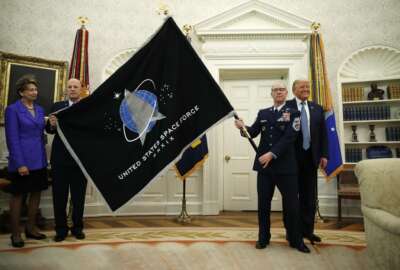
States are vying to become Space Force’s new home
What happens when a new branch of the military is enacted into being? It's got to have a worthy headquarters.
Best listening experience is on Chrome, Firefox or Safari. Subscribe to Federal Drive’s daily audio interviews on Apple Podcasts or PodcastOne.
What happens when a new branch of the military is enacted into being? It’s got to have a worthy headquarters. And although the new Space Command might be tiny compared to the Army or the Air Force, that hasn’t stopped more than half the states from vying to be its new home. Federal Drive with Tom Temin got more from Bloomberg Government senior reporter Travis Tritten.
Interview transcript:
Tom Temin: Travis, good to have you back.
Travis Tritten: Hey, great to be here.
Tom Temin: So what is going on with headquarters? First of all, for the Space Command, they’re actually going to establish a new place with big signs up front?
Travis Tritten: Well, that’s right. Yeah, US Space Command is not yet a year old. It was established last August, last summer. So they need to find a home for it and for now they’ve got a temporary home out in Colorado Springs where you have a big concentration of military Space Operations, but they’re looking for a home and they’re they’re looking at a lot of options.
Tom Temin: And do we know the extent to what they plan to build, are they going to build a campaign or a building or what?
Travis Tritten: Right. Well, this is going to be a headquarters operation. So I’m assuming it’ll be hundreds of personnel and US Space Command is going to hit up operation Space Operations for the US Space Force, which of course, has its own personnel and is going to be based at various places.
Tom Temin: Okay, and what’s going on with the states? You said there’s some something of a drive to say, “come here.”
Travis Tritten: Well, yeah, exactly. I mean, there’s two dozen states that are actively in the race to try to get this headquarters, 26. Their governors had sent in nomination letters to the Air Force as of last month. So now the Air Force is combing through these two dozen nominations to see what might be a viable candidate. And so they’ve really opened up the aperture here. They’re looking at a lot more places. Originally, they had a shortlist of six, but they decided to scrap that and to take a broader look.
Tom Temin: And just out of curiosity, what are the six original spots?
Travis Tritten: You had six original areas in three different states. So you had bases in Colorado Springs, bases like Buckley Air Force Base, and Peterson Air Force Base, Shriver Air Force Base. And these are really bases that are known for their space operations. You also had Vandenberg Air Force Base in California. And you had a Redstone Arsenal in Alabama, which is outside of Huntsville, where NASA has operations. And there’s a huge research hub for different types of space launch activities. And so those were the original places, and those were the usual suspects. If you are going to put a Space Command somewhere, those are probably the first places you would think about.
Tom Temin: And what about Congress? Is there any evidence yet that Congress is trying to steer this because, gosh, that would not be something they’ve ever tried before?
Travis Tritten: Well I haven’t seen any evidence yet, but I think we’re kind of early in the process. The Air Force had this original six candidates over a year ago. And I think that there was a lot of pressure for them to start looking at other places because as we said, the states really want this. It’s a prestige thing. They get federal funding and federal attention if they get this site. One state in particular was conspicuously left off of the original list of six and that’s Florida. And you have Governor Ron DeSantis down there who was lobbying President Trump to try to get in the running for this. So now we see Florida, DeSantis has nominated a handful of counties areas including Patrick Air Force Base, which is right outside of Cape Canaveral and actually has significant Space Operations and as a very legitimate candidate for this. You may see lawmakers in Florida getting involved as we get farther along in this. Also Ohio is in the running, Western Ohio, so you might have somebody like Representative Mike Turner who was on House Armed Services, he’s a ranking member on a subcommittee, you might see him start to get involved as we get farther down the road on this.
Tom Temin: But it’s interesting to hear about a governor offering an Air Force Base location, which is federal property. I mean, it’s not even under the purview in some sense of the state governor. And you would think the Air Force would be aware of that location if there’s a lot of space operations already there.
Travis Tritten: Right, yeah. Well governors have gotten involved in this because it’s seen as such a boon for a state to get this headquarters. In Colorado, you have Jared Polis, who is a Democrat, and he’s been pushing really hard to try to get it located in Colorado Springs, where it’s temporarily situated now. And Colorado Springs really does seem like a front runner. I wouldn’t be surprised if at the end, they actually get this — but he has been pushing very hard for this and Colorado Springs had a national lobbying effort to try to get it located there too. So the states have gotten involved. The governors have got involved. They made these nominations. There’s a lot of competition going on now,
Tom Temin: Of course, Colorado Springs has a lot of Air Force operations already, they got the academy and so forth. So perhaps the Space Command itself would like to be distinct from the Air Force, and not be where they’re be surrounded by Air Force. I’m just guessing. Which leads to a question and that is, did the Space Command offered criteria in its solicitation, and it’s looking around for a possible location as to what it is that it wants in a location?
Travis Tritten: Well yeah, they absolutely did. But the criteria is actually very loose. I’s basically three different criteria. One is you have to be within the 150 largest metropolitan areas in the United States, you have to be within 25 miles of a military base, the AARP has to have rated you with a certain level of living index. And those are the basic criteria. And I mean, if you think about that, so many places could meet that. There’s so many military facilities around the United States, there are plenty of cities. So the criteria is really loose. And I think what the Air Force is trying to do is just to make it seem like this process was a little bit more fair. At the beginning they came out with a short list and I think people felt like they were unfairly left out. So I think they just opened it really, really wide. And they’re going to trim down these applications after the election in November, and they’re going to come up with another shortlist. So I think at that point, we’re going to see some really serious candidates for this. And right now, it’s hard to imagine that 26 states could possibly be equally good homes for Space Command. I think we’ll end up with probably a shortlist of under 10 places where they’re already doing Space Operations.
Tom Temin: Well one thing we know that they’re all the same distance from the space station.
Travis Tritten: Yeah. It’s true.
Tom Temin: Travis Trenton is a senior reporter with Bloomberg Government. Thanks so much.
Travis Tritten: Thank you.
Copyright © 2024 Federal News Network. All rights reserved. This website is not intended for users located within the European Economic Area.
Tom Temin is host of the Federal Drive and has been providing insight on federal technology and management issues for more than 30 years.
Follow @tteminWFED






